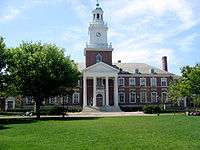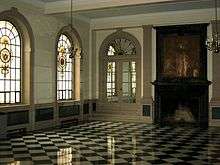Zanvyl Krieger School of Arts and Sciences
| Type | Private |
|---|---|
| Established | 1876 |
| Dean | Beverly Wendland |
Academic staff | Student/Faculty Ratio Undergraduate—9:1 / Graduate—3:1 [1] |
| Students | Undergraduate: 2,790 - Graduate—924 (full-time)/1,379 (part-time)[1] |
| Location | Baltimore, Maryland, USA |
| Campus | Urban |
| Website | http://www.krieger.jhu.edu/ |
The Zanvyl Krieger School of Arts & Sciences, located in Baltimore, Maryland, is one of nine academic divisions of the Johns Hopkins University, in the United States. Located at the university’s Homewood campus at the Charles Village neighborhood in northern Baltimore. It is the core institution of Johns Hopkins, offering comprehensive undergraduate education and graduate training in the humanities, natural and social sciences. Notably, the French department was recognized as a "Center of Excellence" in the study of French culture and language by the government of France, one of only six in the United States. The Writing Seminars department, a program in creative writing, was ranked second-best in the nation by U.S. News & World Report. The school is named in honor of Zanvyl Krieger.
History
Directly descended from the original Johns Hopkins University, which was founded as the nation’s first research university in 1876, the Krieger School is the core institution of the university.[2] The current School of Arts and Sciences was formed when the Faculty of Philosophy merged with the Faculty of Engineering in 1967-1968.[3] With over 60 undergraduate majors and minors and over 40 full-time and part-time graduate programs, the Krieger School’s educational offerings also summer programs available to high school students, visiting undergraduate students, and a post-baccalaureate pre-medical program.[4] Among these academic programs, the Krieger School’s Biology, Creative Writing, English, German, History, History of Art, and Physics & Astronomy departments are among the top-ranked in the nation.[5] In addition, not only are faculty members expected to spend as much time researching as teaching, but also, there are numerous research opportunities for both undergraduate and graduate students, ranging from the university-sponsored Woodrow Wilson Undergraduate Research Program to the nationwide Fulbright Hays Program for graduate students.[6] The most recent enrollment figures available number that the Krieger School has 2,790 undergraduate students, 32 post-baccalaureate students, 924 full-time graduate students, and 1,379 part-time graduate students.[7]
Academics
Humanities

Hopkins students find areas of study in the humanities at Hopkins that either were not available in secondary school or were encountered only at an elementary or introductory level. Courses are offered in philosophy, classical Latin and Greek, history of art, creative writing, comparative literature, Near Eastern studies, film and media studies, and history of science and technology, as well as in the more familiar areas of English and American literature, history, and modern foreign languages. A departmental major allows the student to study a specific discipline in depth and generally leads to advanced study beyond the baccalaureate degree. Students usually take a fairly broad program in the humanities for the first two years. As their interests begin to focus on some specialty, students normally devote the last two years to intensive study in their major or concentration.
Natural Sciences

For the student considering a career in the sciences, Johns Hopkins has much to offer at the undergraduate level. The departments of Biology, Biophysics, Chemistry, Cognitive Science, Earth and Planetary Sciences, Mathematics, and Physics and Astronomy offer programs leading to bachelor’s degrees. All programs offer a sound foundation in the sciences and mathematics and require course work in the humanities and social sciences. Some require a degree of proficiency in a modern foreign language.
Research has always played an important role in the development of scientific ideas and in technological advancement. Most of the faculty members in the natural sciences are actively engaged in research, most often with graduate students. Undergraduates are also encouraged to undertake research under the direction of faculty members. While many of the programs and activities of the science departments are geared to preparation for graduate studies, the breadth and flexibility of the basic programs assure the student of an able preparation for any career in the sciences or related fields as an undergraduate.
Social & Behavioral Sciences

The Hopkins student interested in the social or behavioral sciences will find a variety of programs available in anthropology, economics, geography, history, political science, psychology, and sociology. As in most of the other academic areas at Johns Hopkins, the departments are oriented toward research and the curricula are primarily designed to lead to graduate study. Programs in the social and behavioral sciences are useful as preparation for advanced study in law, medicine, government, business, and urban problems. Independent work is encouraged.
Departments

The Krieger School contains many degree-granting departments, programs, and centers:
- Anthropology
- Biology
- Biophysics
- Chemistry
- Classics
- Cognitive Science
- Earth and Planetary Sciences
- Economics
- English
- Program in Film and Media Studies
- German and the Romance languages
- History
- History of Art
- History of Science and Technology
- The Humanities Center
- International Studies program
- Mathematics
- Near Eastern Studies
- Philosophy
- Physics and Astronomy
- Institute for Public Policy
- Psychological and Brain Sciences
- Political Science
- Program in Public Health
- Sociology .
- Writing Seminars
Notably, the French department was recognized as a "Center of Excellence" in the study of French culture and language by the government of France, one of only four in the United States. The Writing Seminars department, a program in creative writing, was ranked second-best in the nation by US News and World Report.
Advanced Academic Programs
The Johns Hopkins University provides education in a part-time format through the Advanced Academic Programs (AAP). A division of the Krieger School of Arts and Sciences and centered in Washington, DC, [8] AAP provides flexible graduate degrees and certificate programs for adults seeking professional and personal enrichment.[9]
Students can take advantage of online, evening, and weekend courses as well as alternative term formats.[10]
The degree programs are intended to maximize career potential in the most relevant fields. In addition to certificate and dual-degree, AAP program offerings include:[11]
|
|
For maximum flexibility, AAP offers courses at four locations:[9]
- Baltimore, MD (Homewood campus)
- Washington, DC (Near Dupont Circle)
- Rockville, MD (Montgomery County campus)
- Online
Research Centers
The centers offer research opportunities to both undergraduate and graduate programs:
- Center for Advanced Governmental Studies
- Center for Africana Studies
- Center for Educational Resources
- Center for Summer Learning
- Center for the Social Organization of Schools
- Charles S. Singleton Center at the Villa Spelman
- Chemistry-Biology Interface Program
- International Studies Program
- Institute for Applied Economics and the Study of Business Enterprise
- Institute for Biophysical Research
- Institute for Global Studies in Culture, Power & History
- Institute for Multiscale Modeling of Biological Interactions (IMMBI)
- Institute for Policy Studies
- Institute for Quantum Matter
- Center for Civil Society Studies
- Language Teaching Center
- Materials Research Sciences and Engineering Center
- The Krieger Mind-Brain Institute
- Program in Molecular and Computational Biophysics
- The Program in Cell, Molecular, Developmental Biology, and Biophysics (CMDB)
- Phoebe R. Berman Bioethics Institute
External links
References
- 1 2 "Krieger at a glance".
- ↑ "Krieger School of Arts & Sciences". Johns Hopkins University. 2006. Archived from the original on 2006-11-26. Retrieved 2006-12-06.
- ↑ "Women at The Johns Hopkins University: A History". Johns Hopkins University. Retrieved 2009-06-01.
- ↑ "Krieger School of Arts & Sciences Summer Programs". Johns Hopkins University. 2006. Archived from the original on 2006-11-26. Retrieved 2006-12-06.
- ↑ "Krieger School of Arts & Sciences Division". Johns Hopkins University. 2006. Archived from the original on 2006-11-07. Retrieved 2006-12-06.
- ↑ "Krieger School of Arts & Sciences - Funding". Johns Hopkins University. 2006. Archived from the original on 2007-01-11. Retrieved 2006-12-06.
- ↑ "Krieger School of Arts & Sciences - Funding". Johns Hopkins University. 2006. Archived from the original on 2006-11-06. Retrieved 2006-12-06.
- ↑ http://advanced.jhu.edu/about-us/campuses/washington-dc-center/
- 1 2 About JHU AAP
- ↑ Academics at JHU AAP
- ↑ Graduate Degree Programs at JHU AAP
Coordinates: 38°54′31″N 77°02′23″W / 38.908502°N 77.039649°W